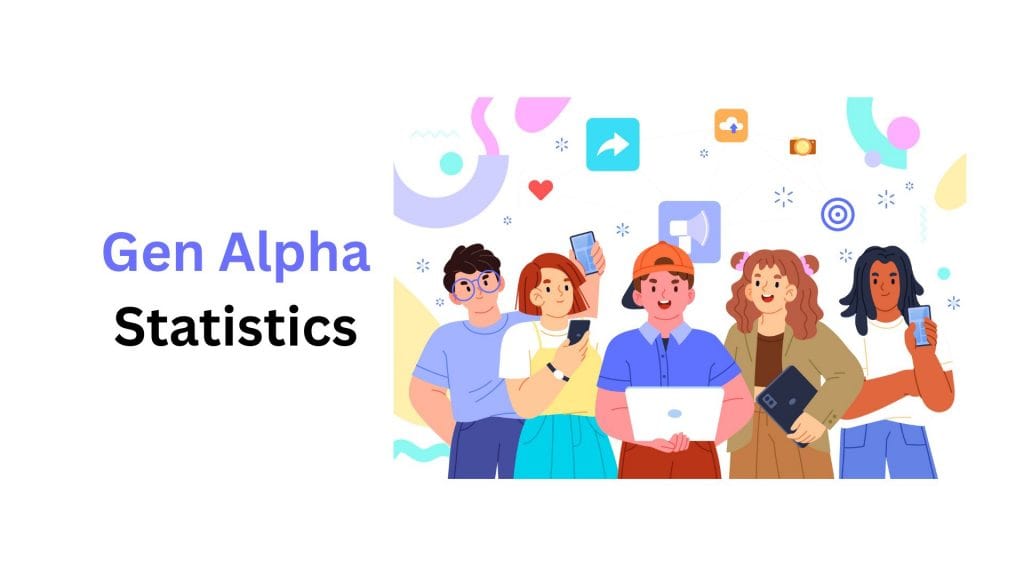Introduction
Gen Alpha Statistics: Well…when we talk about generations, one generation stands out more than any other: Generation Alpha. These are kids born from 2010 onwards, and they’re the first to grow up in a world where iPads, AI, and online classrooms feel completely normal. Unlike Gen Z or Millennials like me, technology isn’t something they adapted to; it’s the world they were born into.
So, this is where I would like to talk about Gen Alpha statistics. These stats become so interesting; the numbers tell us how big this generation is, how they’re learning, what entertainment, and even how businesses think about the future. They’re expected to be the most tech-oriented, diverse, and educated group we’ve ever seen.
In this article, I’ll break down the key gen alpha statistics that show who they are, how they live, and why they matter for the years ahead, and they are the future that the world really needs. Let’s break down everything.
Editor’s Choice
- Generation Alpha is the largest emerging generation, with over 2.5 million new members born every week worldwide, making them the most significant age group of the future.
- They are expected to number nearly 2.2 billion by 2025, which means almost one out of every three children on earth will be a Gen Alpha child.
- Technology defines their lives, with over 65% of kids under 12 using tablets or smartphones daily, and nearly 50% engaging with smart speakers or voice assistants.
- Education is transforming for Gen Alpha, as 70% of them are predicted to experience blended learning, mixing online and offline education.
- They are more diverse than any past generation, with projections showing 50% of Gen Alpha in the U.S. Will belong to a minority ethnic group.
- Parental spending power is massive, with Gen Alpha influencing over $500 billion worth of family purchases globally every year.
- Social media starters earlier for Gen Alpha, with almost 40% of kids aged 8 to 11 having some form of social media presence, often with parental supervision.
- They are health and well-being conscious, as surveys suggest that 60% of parents of Gen Alpha children prioritize mental wellness and healthy screen habits.
- Entertainment is shifting, with platforms like YouTube Kids, Roblox, and Minecraft becoming dominant, drawing more than 70% of Gen Alpha’s screen time.
- By 2030, Gen Alpha will be the wealthiest generation in history, as their collective economic impact is expected to exceed trillions of dollars through influence and spending.
| Aspect | Gen Alpha Overview |
| Global Size |
2.5 million new births weekly; 2.2 billion Gen Alpha by 2025 |
|
Tech Usage |
65% use tablets/smartphones daily; 50% use voice assistants |
| Education |
70% will study in blended learning environments |
|
Diversity |
50% in the U.S. will belong to minority ethnic groups |
| Economic Influence |
$500 billion in family purchases are influenced every year |
|
Social Media |
40% of kids aged 8 to 11 have a social media presence |
| Health & Wellness |
60% of parents focus on mental wellness and healthy screen balance |
|
Entertainment |
70% of screen time on YouTube Kids, Roblox, Minecraft |
| Future Wealth |
Trillions of dollars in economic power by 2030 |
Who is Generation Alpha?
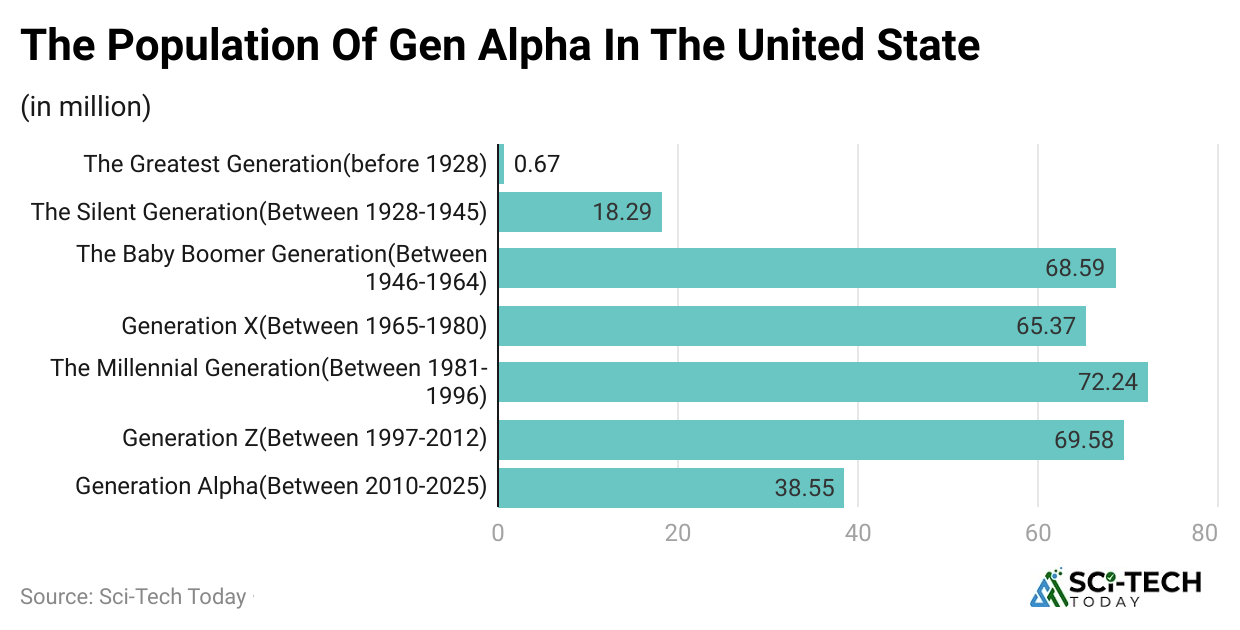 (Reference: demandsage.com)
(Reference: demandsage.com)
- The term Generation Alpha was first coined by social researcher Mark McCrindle in 2008. He wanted to label the group that comes after Gen Z, starting fresh with the Greek alphabet.
- Gen Alpha birth years are from 2010 to 2025, which means the final group of children belonging to this generation will be born within the next year.
- Unlike other generations, Gen Alpha grew up entirely in the 21st century, making them the first generation to have no overlap with the 20th-century lifestyle.
- The global events that shaped them include the COVID-19 pandemic, rapid climate awareness movements, the rise of AI tools, and the dominance of smartphones and tablets.
- They are the children of Millennials and the younger siblings of Gen Z, which also means their parenting styles are very different compared to how Gen Z was raised.
| Aspect | Details |
| Term introduced | 2008 by Mark McCrindle |
| Birth years | 2010 to 2025 |
| Parents | Mostly Millenials |
| Siblings | Often Gen Z |
| Shaping events | Pandemic, AI, digital-first world |
Global Population and Demographics
 (Reference: demandsage.com)
(Reference: demandsage.com)
- By 2025, there will be around 2 billion people who belong to Gen Alpha, making it the largest generation in history.
- Each week, more than 2.5 million Gen Alpha children are born around the world, which shows how fast this group is growing.
- The biggest concentrations of Gen Alpha are in countries like India, China, and Nigeria, which are also countries with high birth rates.
- In the United States, Gen Alpha is already considered the most racially and ethically diverse generation ever recorded.
- The balance of population is shifting, meaning Africa and Asia will hold the largest shares of this generation, while Western nations will have smaller but wealthier groups.
| Factor | Numbers / Details |
| Total size by 2025 | 2 billion |
| Weekly births | 2.5 billion |
| Largest regions | Asia. Africa |
| US trend | Most diverse in history |
| Key Countries | India, China, Nigeria |
Digital Habits and Technology
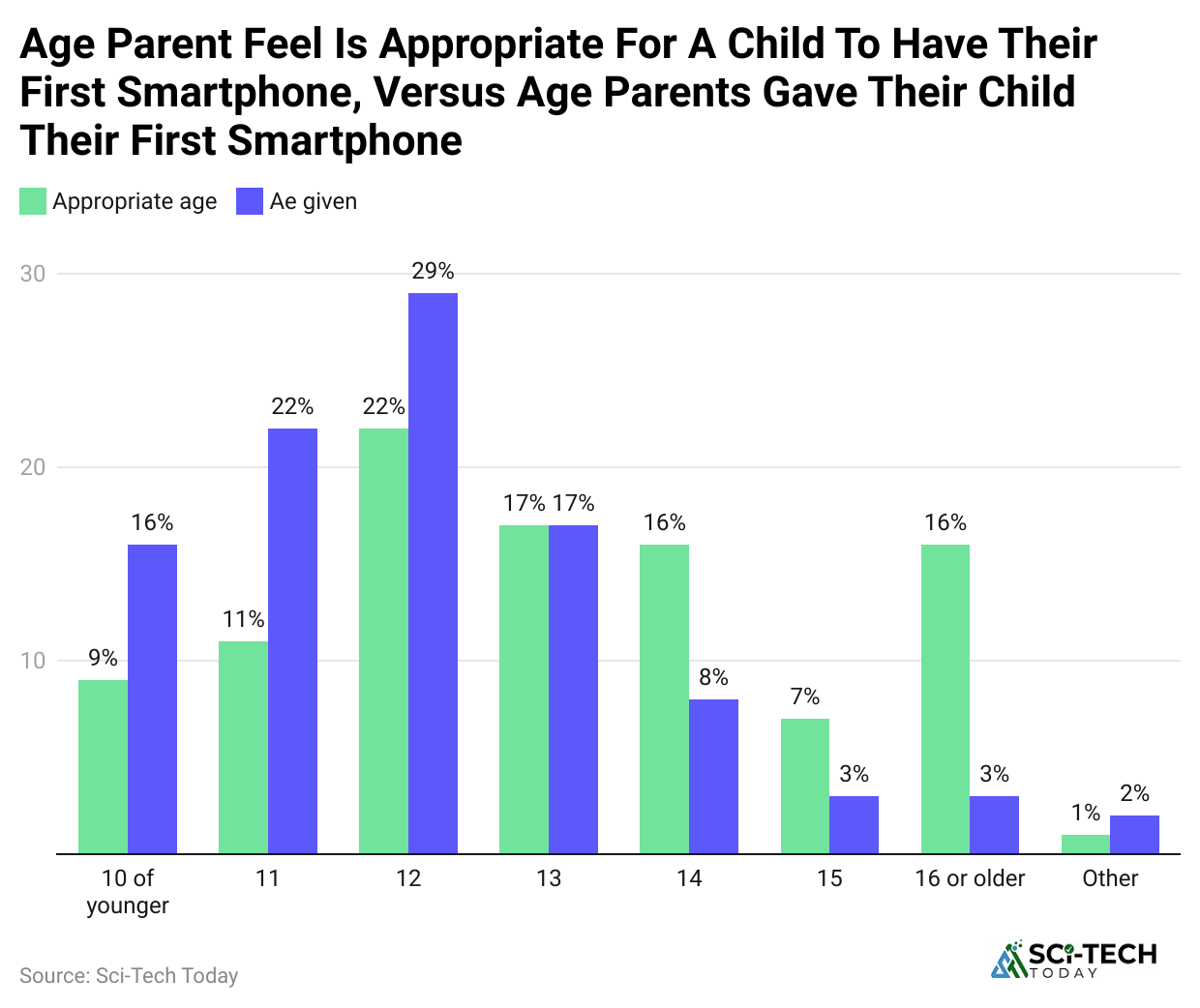 (Reference: byyd.me)
(Reference: byyd.me)
- Gen Alpha is the most digital generation ever. Almost 90% of them in developing countries have internet access by the age of 8.
- They spend about 4 to 5 hours daily on screens, with a big part of that being video content and gaming.
- YouTube is the number one platform, with more than 80% of Gen Alpha kids watching it regularly, often preferring it over TV.
- Social media enters their lives much earlier. More than half of them use platforms like TikTok before the age of 12.
- Gaming is not just fun for them but also social. Games like Roblox and Minecraft are both entertainment and creative outlets.
- Around half of Gen Alpha children are already creating some form of digital content, whether it’s a short video, gaming content, or online art.
| Factor | Number / Details |
| Internet access | 90% by age 8 (developed areas) |
| Daily screen time | 4 to 5 hours |
| Social media use | 50% before age 12 |
| Favorite platform | YouTube, TikTok, Roblox |
| Content creation | 50% create digital content |
Education and Learning
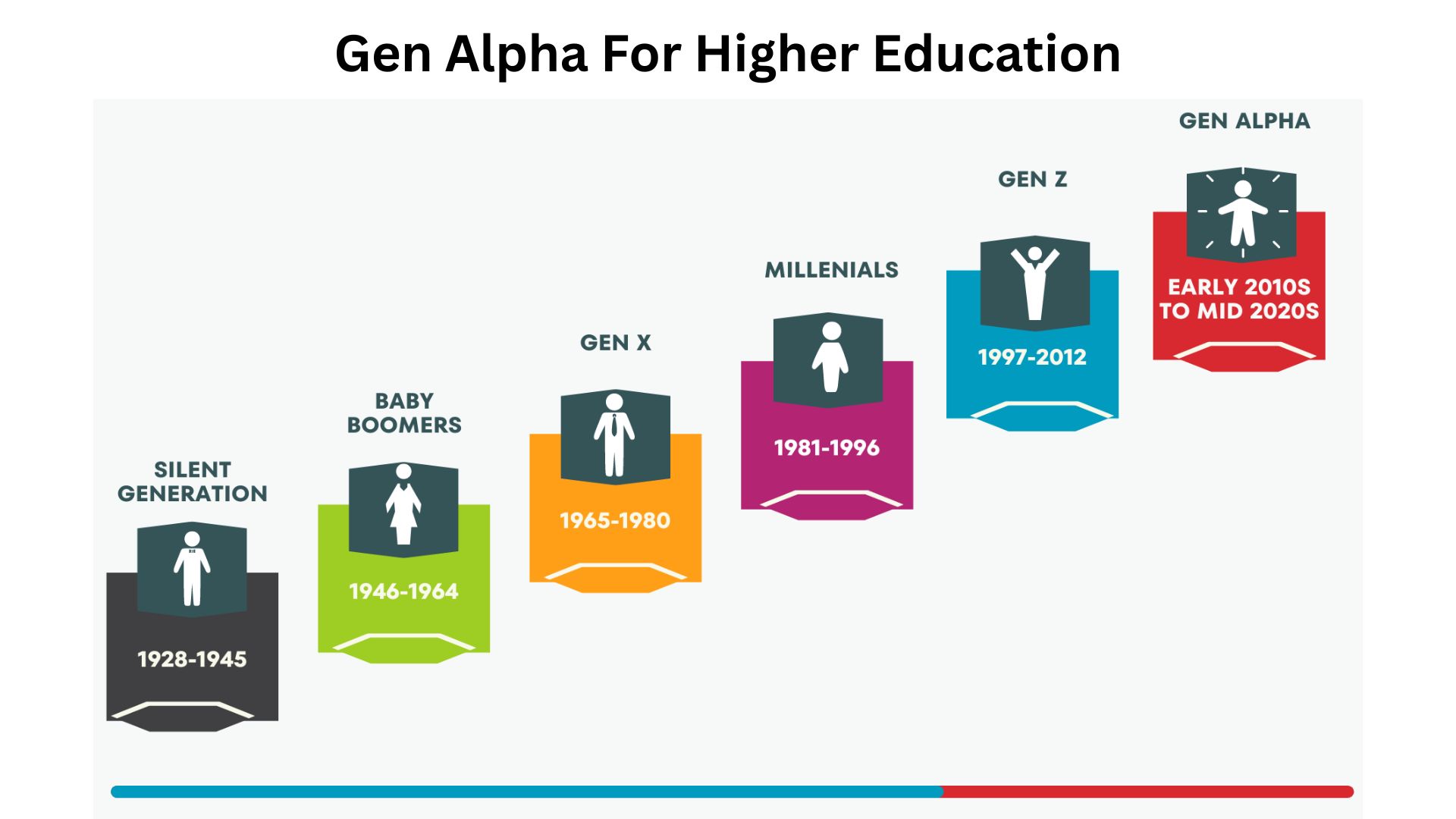 (Source: terminalfour.com)
(Source: terminalfour.com)
- Gen Alpha kids are more comfortable with digital learning compared to traditional methods. Around 80% prefer interactive or gamified learning over plain textbooks.
- Tablets, laptops, and smartboards are replacing books and chalkboards, making digital literacy as important as traditional literacy.
- Parents are heavily focused on STEM; over 90% believe coding and AI skills are necessary for their child’s future.
- Online and hybrid classes became the norm after the pandemic, and Gen Alpha accepts this as a natural way to learn.
- While technology makes learning easier, about 35% of Gen Alpha students report feeling stressed about academic pressure.
| Factor | Details |
| Preference | 80% like digital learning |
| Tools | Tablets, laptops, smartboards |
| Coding exposure | Many before age 8 |
| Parental focus | 90% value STEM skills |
| Academic pressure | 35% feel stressed |
Spending Power and Economic Influence
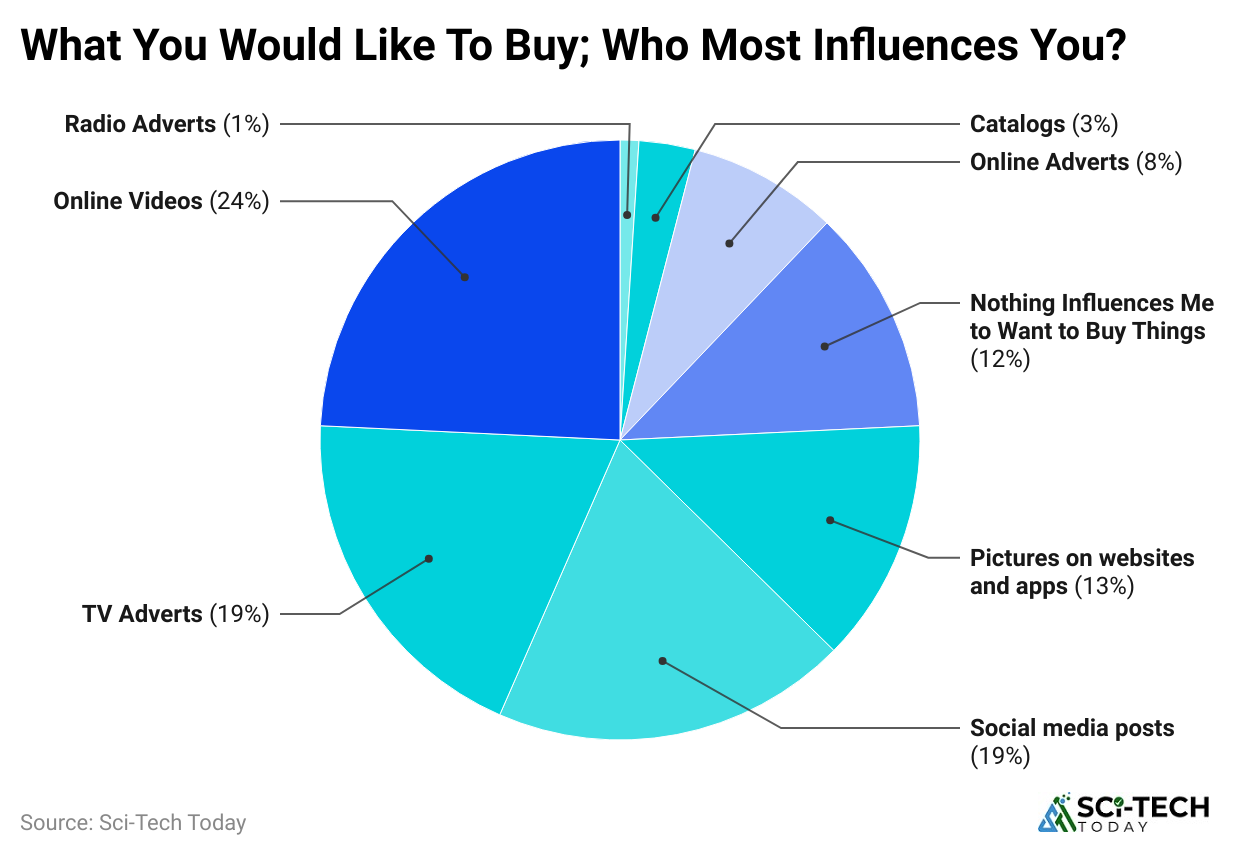 (Reference: digitalmarketingcommunity.com)
(Reference: digitalmarketingcommunity.com)
- Even though they are children, Gen Alpha has a massive economic footprint. Their direct spending power through allowances is worth over 28 billion dollars every week.
- They influence family purchases worth more than 500 billion dollars annually, from groceries to tech products.
- Brand loyalty is heavily tied to values like sustainability and inclusivity, with many choosing brands that align with social causes.
- Nearly half of them trust influencers as much as family recommendations when it comes to buying products.
- By the end of the decade, Gen Alpha will become one of the strongest consumer groups worldwide, far earlier than previous generations.
| Factor | Details |
| Weekly direct spending | $28 billion |
| Family purchase influence | $500 billion yearly |
| Brand preference | Social/environmental values |
| Trust influencers | 49% |
| Future trend | Major consumer group by 2030 |
Lifestyle and Social Habits
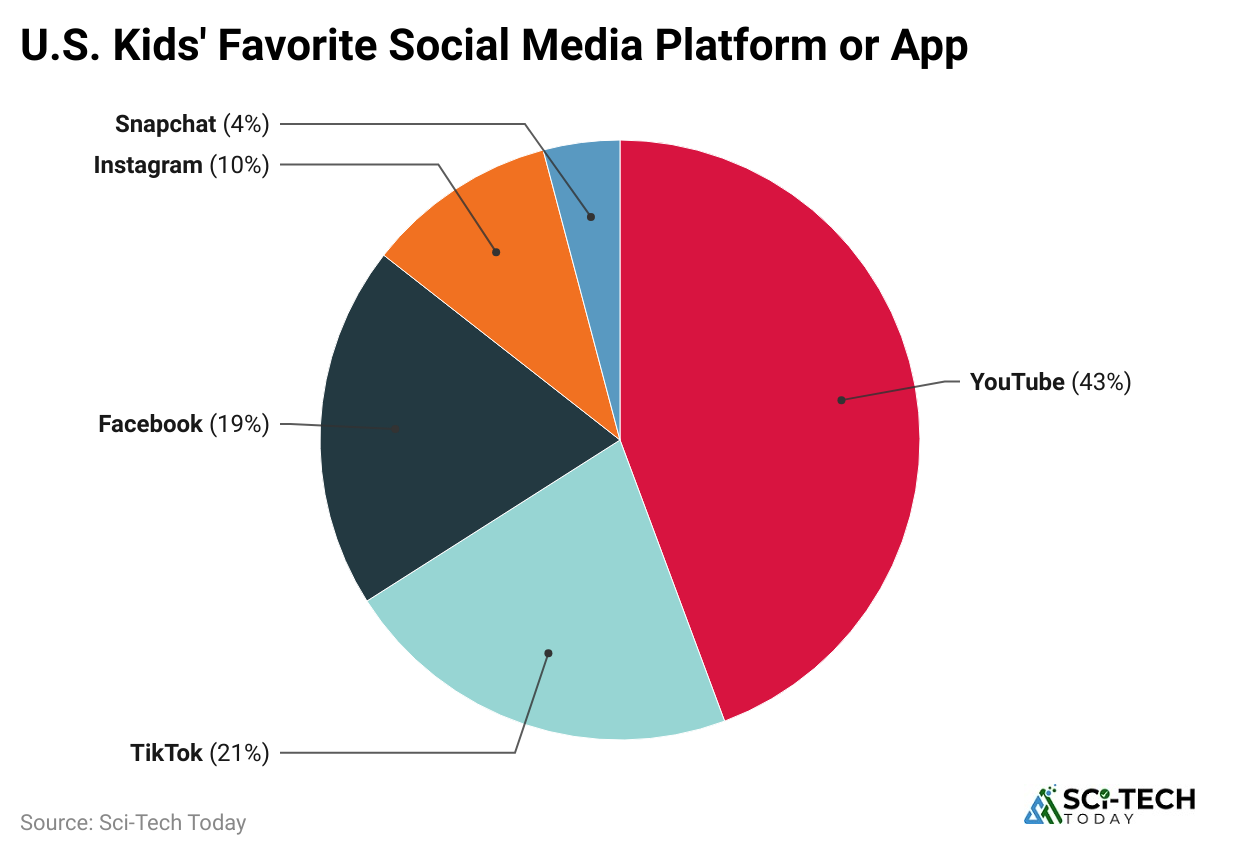 (Reference: explodingtopics.com)
(Reference: explodingtopics.com)
- Traditional TV is almost gone for them. They prefer streaming services and short-form video platforms.
- Gaming doubles as a social activity, where friends connect, chat, and build virtual communities.
- Mobiles and tablets are their main devices, much more than desktop computers.
- They prefer short and interactive content, and attention spans are reportedly shrinking compared to previous generations.
- Fitness, hobbies, and outdoor activities are still important, but screen-based entertainment dominates.
| Factor | Details |
| TV consumption | Dropping rapidly |
| Streaming use | 80% on streaming platforms |
| Gaming | 3 hours daily |
| Device of choice | Tablets, mobiles |
| Content preference | Short-form interactive media |
Mental Health and Challenges
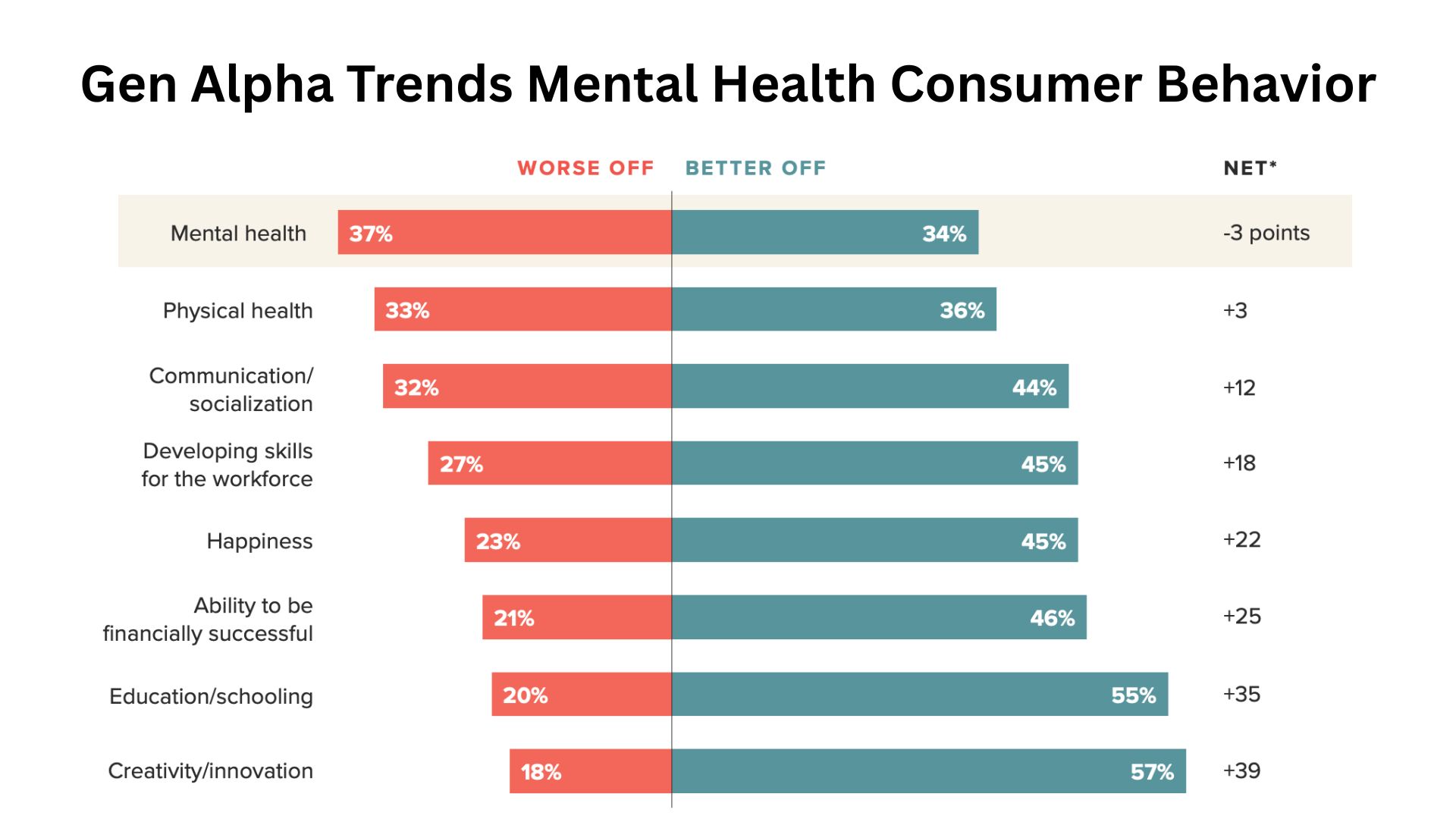 (Reference: morningconsult.com)
(Reference: morningconsult.com)
- About 70% of children aged 7 to 12 reported feeling lonely during pandemic lockdowns.
- Around 8% of Gen Alpha children are already affected by anxiety disorders.
- Cyberbullying has touched nearly 15% of them, showing the dangers of early digital exposure.
- Parents are increasingly worried about digital fatigue and attention span decline.
- At the same time, awareness around mental health is higher, and more resources are being directed at helping young children.
| Factor | Details |
| Pandemic loneliness | 70% felt lonely |
| Anxiety disorders | 8% affected |
| Cyberbullying | 15% experienced |
| Digital fatigue | Growing issue |
| Support demand | Rising yearly |
So, What’s their Future?
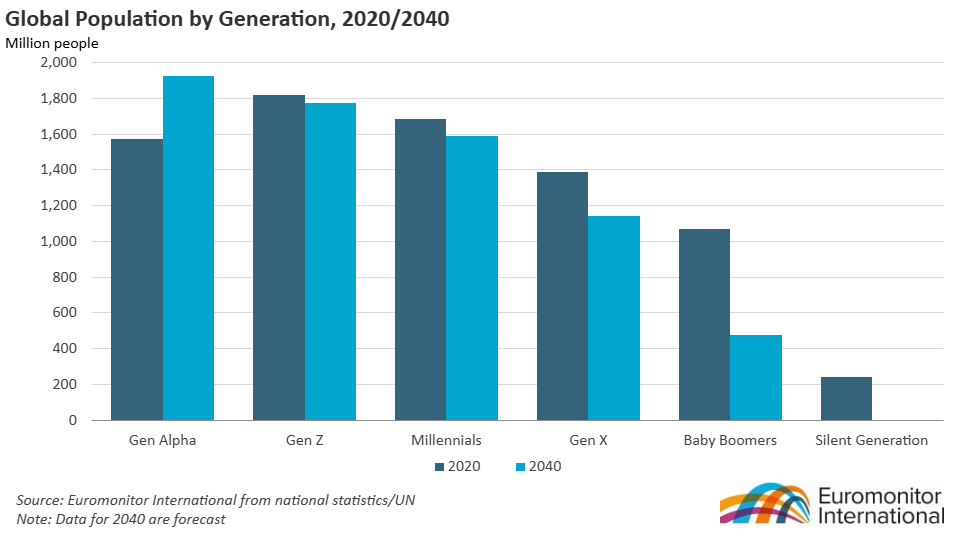 (Source: euromonitor.com)
(Source: euromonitor.com)
- By 2030, the oldest members of Gen Alpha will be in their early 20s, stepping into universities and the workforce.
- They are expected to be the most educated generation in history, with more years of formal learning on average than any before them.
- Their career choices will be shaped by industries like AI, robotics, renewable energy, biotechnology, and digital media.
- Gen Alpha is likely to push even harder for global sustainability, equality, and inclusivity.
- Their combined economic and cultural power will be unmatched, influencing politics, business, and culture worldwide.
| Factor | Details |
| Age in 2030 | 20 years (oldest members) |
| Education trend | Most educated in history |
| Career focus | AI, robotics in history |
| Social values | Equality, sustainability |
| Economic role | Dominant consumer group |
Conclusion
So, when we look at Gen Alpha, it’s pretty clear that they’re not just a typical group of kids growing up; they’re literally the future of our world. They’re growing up in a world where touchscreens come before textbooks, where diversity is the rule, and where their voice already shapes how families spend money. By the time they’re teenagers, they’ll be more tech-oriented, more connected, and probably even more influential than we can imagine right now.
Gen Alpha will surely change education, technology, businesses, and culture itself. They’re the most global, most digital, and possibly the most powerful generation we’ve ever seen. And while it’s still early days, one thing’s certain: the world they inherit won’t just adapt to them, it will be built around them. I hope you like this one. If yes, kindly let me know your thoughts in the comment section. Thankyou.

